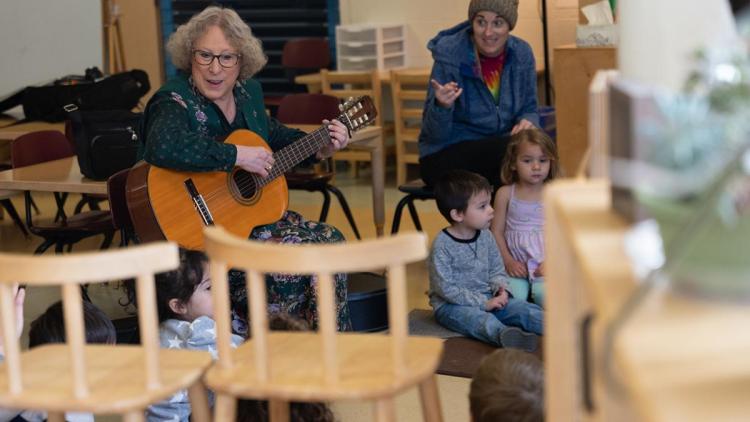At the back of a classroom filled with singing toddlers, a timid trio of boys squirms to find the rhythm. Leading them in song is Wendy Sims, silver curls bouncing in time with her clapping — and stomping, marching and flapping.
Sims punctuates each verse with an enthusiastic “Good for you!” and even provides a confidence boost by confiding that they’re “probably better at this than the preschoolers.” Before long, the entire giggling gaggle is feeling the groove — even the previously bashful wallflowers.
“Children might not be able to verbalize things like changes in tempo, but we can see that they understand it because they are doing it,” said Sims, director of music education at the University of Missouri School of Music. “The goal is that they learn to love music early on. Not just singing and dancing, but also listening to different kinds of music.”
Sims volunteers weekly at the MU Child Development Laboratory, something she has done for 37 of her 38 years at Mizzou. The sessions, in addition to being fun and fulfilling, inform Sims’ research and help maintain a connection to the fundamentals of childhood music education. It’s not lost on her college students as they learn how to teach youngsters from tots to teens.
“Dr. Sims says, ‘be childlike, not childish,’ when working with the little ones, and that has stuck with me,” said Sean Hayes, a School of Music alumnus from St. Louis who now teaches K–5 music in St. Petersburg, Florida. “You’re meeting the children at their level, but you’re still the adult in the room, guiding them through the lessons.”
Sims’ research focuses on how children perceive, and demonstrate that they perceive, music. She believes music is a vital part of the holistic elementary curriculum for many reasons, not the least of which is the intellectual and sensory stimulation, and lifelong enrichment it provides. But it also provides another entry point — aside from reading, writing and arithmetic — for kids to get excited about learning.
“During my MU student-teaching experience at Fairview Elementary School in Columbia, there were some students who you could tell had truly found a home in the music room,” said Chloe Prewett, a pupil of Sims who is set to graduate in May. “Some kids might even act out in other classes, but in music they join in, and they’re focused.”
Sims found her home in the music room as a ninth grader, when she volunteered at a child care facility and brought her guitar for fun. She had always been musically inclined (she plays piano, too), and even knew she wanted to teach at a young age. But playing for the children that fateful day set her lifelong course.
“Teaching the little ones and teaching college students, in some ways, is not that different,” Sims said. “It’s all about working with them to see the light come on — when they ‘get it.’ Teachers live for those moments, but right now we’re not getting enough young people preparing to be teachers. All of our graduates, if they’re looking for a job, find one in a school — 100% of them.”
Sims’ students continue to seek her mentorship long after commencement. Those relationships have garnered her a Kemper Fellowship for Excellence in Teaching and a Missouri Governor's Award for Teaching Excellence. She has also served as the music curriculum consultant for a PBS TV show based on the Angelina Ballerina book series.
“From the time I met her as an incoming student at Mizzou, Dr. Sims has been very intentional, always bringing things back to the lessons at hand and the foundational things we are learning,” Hayes said. “She shows she cares for people by setting them up for success and encouraging her students — young and older — to reach their full potential.”
Watch a video of
